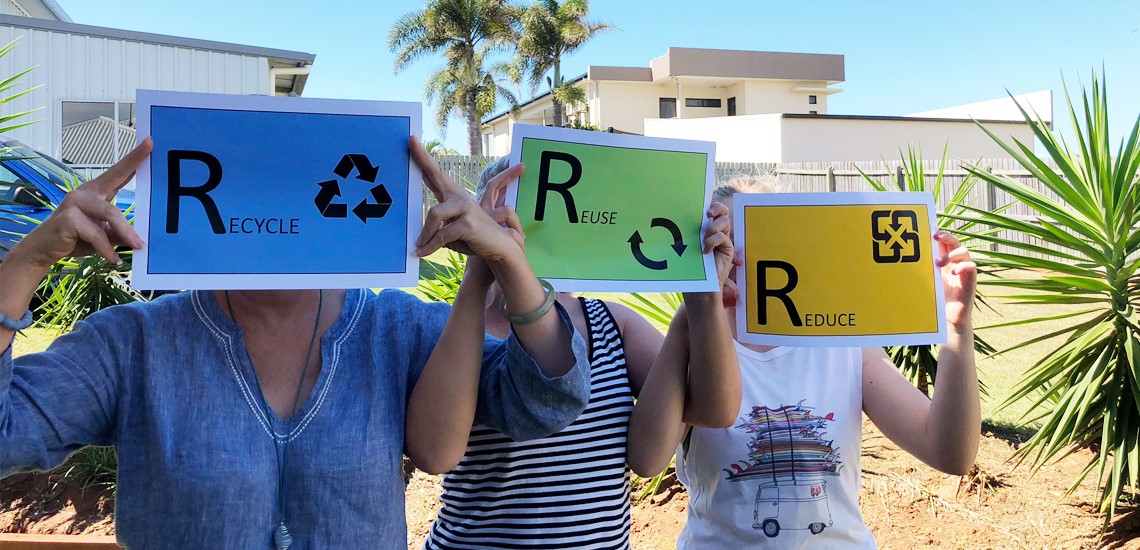The Planet Project...

Three months into The Waves making a conservative effort to operate in a more environmental sustainable manner, I am pleased to report that already there has been clear benefits. The most noticeable is the 9% reduction in our electricity bill from March 2017 until March this year. Because of a Recycling Bar Procedure implemented a few weeks ago, the designated recycle bin allocated in each bar, are now used 80% of the time. Great effort – and this is only early days.
I am embarking personally on a new project – I have named it The Planet Project. Inspired by my daughter; it requires following the principles of the three R’s (and no, not Reading, Writing and Arithmetic, which for any of you old enough, would remember the three Rs as the foundation of the education programs in schools, a long time ago! No wonder so many of us carry confusion around our English language.) Nevertheless, the more recent established three R’s, represent Reduce, Reuse and Recycle.
Called the three R’s of waste management, this waste hierarchy is the guidance suggested for creating a sustainable life.
Other that the benefits this The Planet Project will have on our planet, this project will be made more exciting as I will be undertaking it with my daughter (34 years old) and granddaughter (14 years old). To challenge us further, our two households have committed to no purchasing of any items which contain plastic for the month of May. Well… when I refer to my household, I refer to me sharing what I perceived as a great idea with my husband, who in-turn will throw his head back while rolling his eyes, obviously not sharing the same excitement towards our project.
The First ‘R’ – Reduce
Collectively, Australian’s throw away approximately $2.9 billion of fresh food - $630 million of uneaten takeaway food - $876 million of leftovers - $596 million of unfinished drinks and $241 million of frozen food every year. Staggering! Our aim through The Planet Program is to only buy food as w not needed and car-pooling where possible.e need it and be creative with the ingredients we already have, reducing the carbon emissions caused by dumping these items. Additionally, we will make a conservative effort to reduce the amount of washing we do (billions of micro plastics are emerged in the sea every week as our clothes are made from plastics to certain degree), turn lights and power-points off that are
The Second ‘R’ – Reuse
We have become a throw-away society, as it's quite often cheaper to buy a replacement product than pay for repairs. What I think is overlooked are the number of items that can be used by others. There are the obvious objects that we so kindly donate to charity, but items such as shredded paper and ground coffee beans are incredibly nutritious for our gardens, and there are always day-care centres happy to accept cereal boxes, egg cartons and the like. A few months ago, we donated some jigsaw puzzles, books and magazines to a local aged-care facility – how grateful they were. Now we must remember to take our own cup when we buy our takeaway coffee, print on both sides of the paper and keep making scribble pads from unwanted paper. Remember - “One man’s trash is another man’s treasure.”
The Third ‘R’ – Recycle
Every year, the average Australian family produces enough rubbish to fill a three-bedroom house, each person producing approximately 2.25 kg of waste per day. It is interesting then that there are very few materials on the earth that cannot be recycled. The secret is to learn which products can be recycled and choose our products carefully. There are recycling stations that accept a whole range of things; making that effort to separate our waste and find these stations will be a challenge for two families that are time-poor. For me personally, it will be remembering to take my calico bags out of my car before I walk into the shops!
Five people (occupants of the two households) can make a difference - by refusing to buy items we don’t need, reusing items more than once, and correctly disposing of items that are no longer in use, we can contribute towards reducing our carbon footprint and in-turn, create a healthier and happier planet for ourselves and future generations.
With our principles and parameters in place, it will be interesting to see how our three generations brainstorm ideas and overcome the challenges this project is sure to present.
“Be the change you wish to see in the world”
-Judi